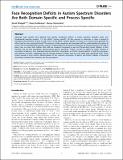| dc.contributor.author | Weigelt, Sarah | |
| dc.contributor.author | Koldewyn, Kami | |
| dc.contributor.author | Kanwisher, Nancy | |
| dc.date.accessioned | 2013-09-30T16:44:22Z | |
| dc.date.available | 2013-09-30T16:44:22Z | |
| dc.date.issued | 2013-09 | |
| dc.date.submitted | 2013-06 | |
| dc.identifier.issn | 1932-6203 | |
| dc.identifier.uri | http://hdl.handle.net/1721.1/81243 | |
| dc.description.abstract | Although many studies have reported face identity recognition deficits in autism spectrum disorders (ASD), two fundamental question remains: 1) Is this deficit “process specific” for face memory in particular, or does it extend to perceptual discrimination of faces as well? And 2) Is the deficit “domain specific” for faces, or is it found more generally for other social or even nonsocial stimuli? The answers to these questions are important both for understanding the nature of autism and its developmental etiology, and for understanding the functional architecture of face processing in the typical brain. Here we show that children with ASD are impaired (compared to age and IQ-matched typical children) in face memory, but not face perception, demonstrating process specificity. Further, we find no deficit for either memory or perception of places or cars, indicating domain specificity. Importantly, we further showed deficits in both the perception and memory of bodies, suggesting that the relevant domain of deficit may be social rather than specifically facial. These results provide a more precise characterization of the cognitive phenotype of autism and further indicate a functional dissociation between face memory and face perception. | en_US |
| dc.description.sponsorship | Ellison Medical Foundation | en_US |
| dc.description.sponsorship | Simons Foundation | en_US |
| dc.language.iso | en_US | |
| dc.publisher | Public Library of Science | en_US |
| dc.relation.isversionof | http://dx.doi.org/10.1371/journal.pone.0074541 | en_US |
| dc.rights | Creative Commons Attribution | en_US |
| dc.rights.uri | http://creativecommons.org/licenses/by/2.5/ | en_US |
| dc.source | PLoS | en_US |
| dc.title | Face Recognition Deficits in Autism Spectrum Disorders Are Both Domain Specific and Process Specific | en_US |
| dc.type | Article | en_US |
| dc.identifier.citation | Weigelt, Sarah, Kami Koldewyn, and Nancy Kanwisher. “Face Recognition Deficits in Autism Spectrum Disorders Are Both Domain Specific and Process Specific.” Edited by Marina Pavlova. PLoS ONE 8, no. 9 (September 11, 2013): e74541. | en_US |
| dc.contributor.department | Massachusetts Institute of Technology. Department of Brain and Cognitive Sciences | en_US |
| dc.contributor.department | McGovern Institute for Brain Research at MIT | en_US |
| dc.contributor.mitauthor | Koldewyn, Kami | en_US |
| dc.contributor.mitauthor | Kanwisher, Nancy | en_US |
| dc.contributor.mitauthor | Weigelt, Sarah | en_US |
| dc.relation.journal | PLoS ONE | en_US |
| dc.eprint.version | Final published version | en_US |
| dc.type.uri | http://purl.org/eprint/type/JournalArticle | en_US |
| eprint.status | http://purl.org/eprint/status/PeerReviewed | en_US |
| dspace.orderedauthors | Weigelt, Sarah; Koldewyn, Kami; Kanwisher, Nancy | en_US |
| dc.identifier.orcid | https://orcid.org/0000-0003-3853-7885 | |
| mit.license | PUBLISHER_CC | en_US |
| mit.metadata.status | Complete | |
